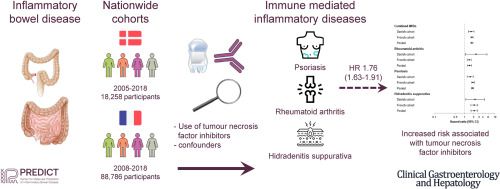Safina Gadeock
Posts by Safina Gadeock for News

IT'S A WRAP
As the year comes to an end, I would like to take this opportunity to thank all who contributed to the Gut Health Network news items, it has been truly enlightening. We thank all our members for their continued support and wish all our patients and whānau a Merry Christmas and a Happy New Year. We will resume our website activities mid January, 2025. However, please feel free to reach us through contacts. We will be actively monitoring it over the holidays. Hope you all have a lovely break with friends and family. See you in 2025.

Anti-TNF therapy for IBD patients is associated with increased risk to Immune Mediated Inflammatory Diseases
Anti-TNFs are primary therapies for several immune-mediated inflammatory diseases (IMIDs). However, case studies have revealed the paradoxical occurrence of IMIDs in patients treated with anti-TNF. The authors in this study conducted 2 nationwide cohort studies comprising all patients with IBD in Denmark (2005–2018) and France (2008–2018). They showed that anti-TNF was associated with an increased risk of rheumatoid arthritis, psoriasis, and hidradenitis suppurativa in both the Danish and the French cohort. Anti-TNF was also associated with an increased risk of the outcomes when compared with azathioprine suggesting that anti-TNF therapy was associated with an increased risk of rheumatoid arthritis, psoriasis, and hidradenitis suppurativa.

Vedolizumab supports intestinal stem cell recovery.
A recent study from the University of California, San Francisco showed that Vedolizumab (VDZ), an anti-integrin antibody, effective in the treatment for Colitis, plays an important role in limiting specific inflammatory immune, fibroblasts and endothelial cells to facilitate intestinal epithelial stem cell recovery. By using a combination of latest sequencing technologies, they provide a tool for comprehensive analysis of the inter cellular networks of the colon in health, disease, and during treatment. Implementing these new single-cell and spatial technologies simultaneously in individual patients will lead to more precise treatment algorithms, and therefore a way for precision medicine.
Click on the link below to see the study
https://www.nature.com/articles/s41467-024-45665-6?fromPaywallRec=false#Sec2